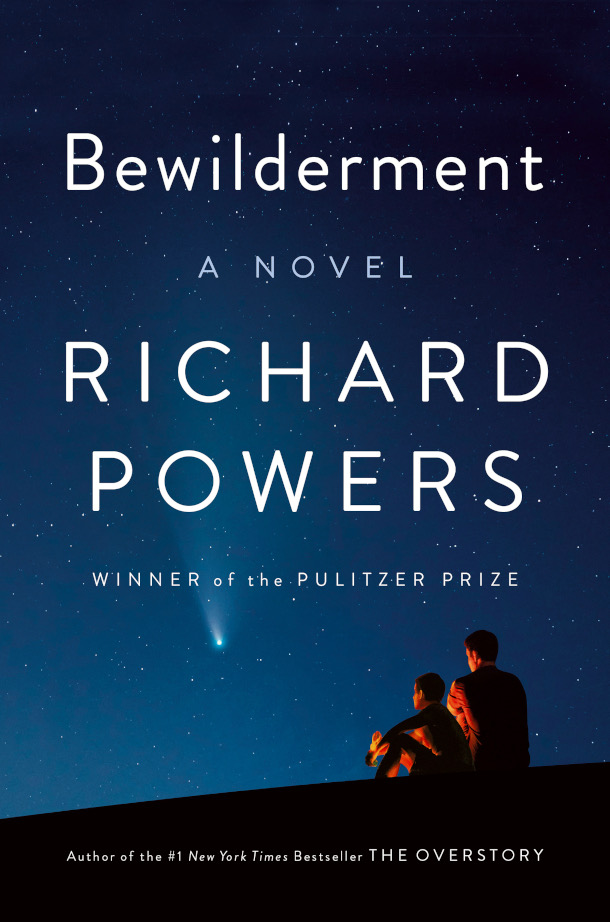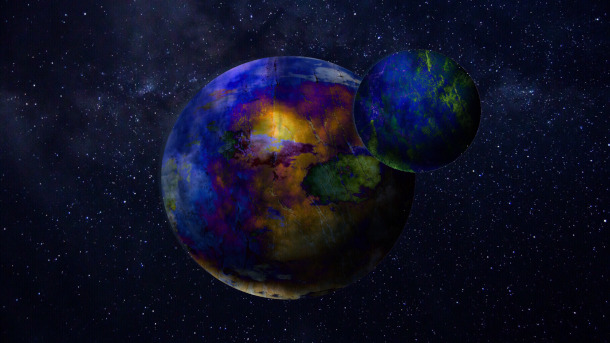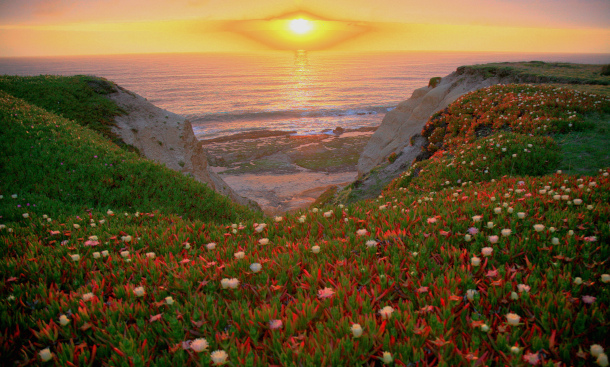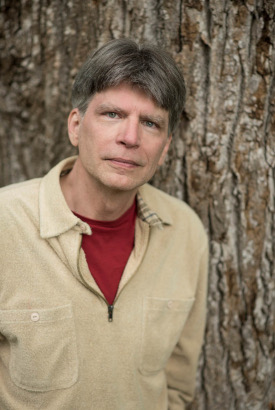Bewilderment
Air Date: Week of October 15, 2021

Richard Powers’ “Bewilderment” follows a father, Theo, and his son, Robin, as they navigate environmental issues like a growing species extinction crisis, alongside personal concerns like the recent death of Theo’s wife and Robin’s neurodivergence. (Photo: Courtesy of Richard Powers)
Richard Powers, the author of Pulitzer Prize winning novel “The Overstory”, is back with a new science fiction book, “Bewilderment”. The novel follows a father, Theo, and his son, Robin, as they navigate environmental issues like a growing species extinction crisis, alongside personal concerns like the recent death of Theo’s wife and Robin’s combined autism, obsessive-compulsive disorder, and attention-deficit hyperactivity disorder. Richard Powers joins host Steve Curwood to discuss “Bewilderment” at the first Living on Earth Book Club event of Fall 2021.
Transcript
CURWOOD: It’s Living on Earth, I’m Steve Curwood.
Richard Powers, the author of the Pulitzer Prize winning novel “The Overstory” is back with a new science fiction book, “Bewilderment.” “The Overstory” was a sweeping exploration of our relationship with nature and the people who fight to save it. “Bewilderment” picks up on that theme at a much more intimate scale through the eyes of a father, Theo, and his son Robin. On an Earth a lot like our own but not quite the same, they stumble, bewildered, between crises. There’s the recent death of Theo’s wife and Robin’s mother and a growing species extinction crisis. And Robin has neurodivergence and erratic behavior. And these characters speak of their imperiled planet’s loneliness in the universe, a matter famously explored by physicist Enrico Fermi. Richard Powers joined us to discuss Bewilderment for our first Living on Earth Book Club event of Fall 2021. He explained that like Fermi, Theo is also a scientist who asks big questions of the universe.
POWERS: In Bewilderment, the main story is about this troubled nine-year-old, and his father who's in his late 30s, who is an astrobiologist, and it's his father Theo's field astrobiology, that actually does get folded back into this personal narrative between the father and the son. That's the Powers part of this novel, the science part of this novel.
CURWOOD: Well, yeah, and of course, you have great fun, you know, stating the classic, you know, either we're completely alone, or there must be many of us. Although, actually, I think Enrico Fermi talked about this, the fact that we are here means that there must be more of us, because otherwise, we wouldn't be here at all.
POWERS: Yeah, there's a famous story about Fermi, I think he was out in Los Alamos in the early 50s, maybe 54, I think, and they were having lunch in the cafeteria and other colleagues of his were talking about, you know, the revolutions in astronomy that was showing that the universe is probably a good deal older, and a good deal larger than previously thought, which, you know, Fermi thought about for a while. And when he had sort of crunched the numbers a bit, he stopped and said, Then where is everybody, and this has come to be called the Fermi paradox. The numbers are sobering, the universe is three times older than the Earth, there are 100 billion galaxies, or more, each of those galaxies has on the order of 100 billion or more stars. And we now know that each of those stars is likely to have one or more planets. That's a lot of real estate, and a lot of time and, you know, it seems logical that we ought to be able to look up in all of that expanse, you know, having unfolded for all of that length of time and see some evidence of somebody else out there. But even with this great explosion of our ability to look and get fine details from very, very far away, this explosion of data over the last couple of decades, we are still confronted with what the people who think about the Fermi Paradox call the great silence.
CURWOOD: Well, yes. But isn't it a little bit arrogant, though, for us humans to think that we would even know about all of this, when I reflect on this, I think of you know, bees, they're greatly organizing in a social colony. And yet a bee would have no idea about this technology that you and I are using to talk to each other now, computers and all that. So just because we don't get it as humans, you know, maybe this all this connection is way above our pay grade. Richard, you know, maybe it's just.. [LAUGH]
POWERS: Well, there are two aspects to the the Fermi paradox. One is the one that we leap immediately to, which is where are the intelligent civilizations? And why aren't we getting signals? Why don't we see von Neumann replicating machines flying around the solar system? Why don't we see Dyson spheres, you know, advanced civilizations that have turned their stars into, you know, completely efficient solar cells? Well, that's one question. And certainly the search for intelligent life is always going to get the headlines. But astrobiology as a discipline, and it's still a very young discipline is probably more concerned with this larger question of life in aggregate, what are its affordances? What are its capacities? How easy or difficult is Abia Genesis, the beginning of life on a planet? What are the ranges of tolerance of life in the discovery of extremophiles on Earth has greatly broadened that envelope. Still, what Theo was looking for in the story is not intelligent life. He is developing computer models, to spectroscopy on the light coming through a planet's atmosphere. And looking at those spectra, looking for the fingerprints, the bio signatures for kinds of life that are probably microbial, they may be like ours, but they may have different kinds of chemical metabolic pathways. And just looking at every possible way that we would be able to look at an atmosphere and say, that planet is no longer restricted to merely physics and chemistry. That planet is alive, it has a biosphere. And that would be a revolution. You know, for us to discover that that would be a milestone in terrestrial human history. And it would change the way that we think about ourselves, even if it were only microbial life.

In Bewilderment there are questions about alien life on fictional planets juxtaposed with a dystopian image of a country falling apart. (Photo: lforce, Flickr, Public Domain)
CURWOOD: Talk to me about your characters. You have Theo, his son, Robin. Robin is nine which you pick the person who hits just right that sweet spot of latency, right? They're really able to reason. The hormones haven't driven them crazy yet.
POWERS: There's still a tenderness and vulnerability of early childhood. And they're just about to go into that tumble of pre-adolescence. So Robin's mother has died about two years before the start of the story. And Theo knows that he's in over his head, he doesn't know how to deal with this boy whose behavior is increasingly volatile, you know, all he knows is that he loves the boys so much that he would do anything in his power to protect them from the world, but he doesn't know what that is. And he will not lie to the boy. And part of the trauma, of course, is personal, the loss of the mother at an early age, you know, may be enough to account for the wildest kind of behavior. But part as the story goes on, is caused by Robin, who, like so many children is kind of a pantheist or animist, you know, just sees the sacred and everything that's alive, you know, E.O. Wilson's biophilia is still going full tilt in this boy. And he is beginning to learn about this mass extinction that we've leveled on the earth. And it's a reality so devastating to him that he, you know, turns his anger and confusion and hostility outwards onto his father and not to the humans around him.
CURWOOD: What's your experience with children? By the way, Richard, do you have your own? Are you close to someone this age?
POWERS: I have a lot of experience having been a child for probably too much too long. And I have many nieces and nephews, both you know blood and by marriage. I do not have children myself. But I feel as if on at least three occasions, I've had a kind of surrogate parent relationship to children who have been in trouble with the world in one way or another, or whose behavior has pushed them outside of the media and on a normal distribution curve. And those were the kids that I was channeling when I tried to figure out who Robbie was and how he worked. And I have to confess that I think that the deeper I got into creating Robbie, the more I realized that I was drawing on my own sense of differences as a child. So it was a process of self discovery too for me to write the book.
CURWOOD: Wow. So when did you discover that this planet we call home is really in terms of the species that we know and love, including us is in a lot of trouble?
POWERS: Yeah, I asked myself that question. You know, what age that really become conscious of what kind of cataclysm we're facing down? And I do think that the first inklings -- you know, I was born in 1957. And so let me put that as one bookend on, you know, trying to locate my own childlike understanding of the environmental crisis. On the other end of that bookend, I'll put my second novel where I actually address global warming and climate change fairly early on for American fiction. That novel appeared in 1988. And while the scientists, of course, had been trying to make the case and bring the reality in front of the American public for years before that, you know, literary arts, obviously, were lagging in thinking of that, or using it as a meaningful component of a narrative. I do remember the first Earth Day very vividly in 1970. And so I would have been 13. And I guess that's somewhere in that window, you know, somewhere probably in my early teens, I began to take on that sense of dread that we all live with in one way or another, and we adults get very good at shunting it off and finding ways to whittle it away. But children don't do that. And I think that Robin's eco-trauma in bewilderment is very representative, even though he may be a, you know, a neurodivergent child, that element of his sensibility, the real despair and the real bewilderment that he feels in the face of the diminishment of the Earth is very representative of young people. And everything from my anecdotal experience to very recent polling shows that we have an epidemic of eco anxiety on the part of the young.

“Bewilderment” means to be perplexed or confused, and comes from a root word meaning “wilderness”. In his novel, Richard Powers seamlessly weaves together these sentiments. (Photo: Steve Jurvetson, Flickr, CC BY 2.0)
CURWOOD: So without saying too much about what's in the book. What's amazing about your book, Richard is as you go to the hardest thing about the ecological disaster we're facing by dealing with feelings, by going to the emotion, you know, there's no recitation of facts here, or sort of cold reality of things. It's very much an exploration of feelings of how emotions work with us and among us, how they can even in some senses be shared. Wow, that's a pretty deep dive.
POWERS: You know, there was a line in my previous novel, The Overstory. All the best arguments in the world won't change a person's mind. The only thing that will do that is a good story. And I do think that reflects something about the way that our consciousness is structured, we have enormous capacity for empathy, for imagining ourselves into another person's life. But generally, through this technique of storytelling, and narrative, you know, we identify with the character in a story and we say, Who would I have to be to feel that way? And what would my life look like from that perspective? People change their world views, or they change their allegiance to convictions, not through being argued out of them, not through tables, and graphs, and charts. But through something in some invitation to imagine themselves in another circumstance, or through another lens, or from another perspective. And that's why the story is so devoid of the usual kinds of approaches to the climate crisis to the extinction crisis. It's just a dad and his kid. And you can choose, you know, as a reader, you can say, I remember, being a child like that and being frightened or believing in the sacredness of life, you know, the more than human life. Or you can say, holy cow, that dad, he is in trouble, because you cannot turn away from a nine year olds question and what I say to that kid, if the kid was asking me. And all of those acts of empathy, I think, are kind of end around on getting the reader engaged again, in a set of concerns that most of us have learned how to put the damper on.
CURWOOD: So taking it deeper, when you started to create these characters, and gave them through a little bit of sci fi, this fluency and emotional sharing. What did it change for you?
POWERS: How did I change in the act of writing the book? Yeah. Now that's, that's a good question. Wow. I wrote this book over a relatively short period of time during the pandemic. And there was a kind of psychotherapy for me in recreating myself, both as the son and as the Father, and living these roads lives not taken. And there was also a strange, cathartic pleasure in trying to create a hypothetical earth that looked a lot like the earth that we were living through under the Trump administration, but diverge from it in some significant ways, which I think was just simply therapy, you know, cast yourself back a year, year and a half. And think of how crazy it was day to day, what is going to happen? How far can we go? Where is this country going to land and, you know, hitting the refresh button button on your news feed, you know, three, four, or five times an hour or more, that was the world that created this book. It's a short book, and it's entirely narrated by the Father, and it's restricted to these two main characters. But it's a book that very intensely tries to grab something of the anxiety of the Zeitgeist circa 2020.
CURWOOD: Yet part of the Zeitgeist is social media or something that I'm more and more beginning to call anti social media, or its dark side, right?
POWERS: Have you seen that a lot of people are just starting to call it social, you know, they'll leave out the media and just say, you know, oh, I saw that on social which is pretty scary.
CURWOOD: As if it's real. So again, without any spoilers here. To what extent was that a device and to what extent does that reflect your feelings about what's going on in the way that we communicate these days?

Richard Powers is an American novelist whose works explore the effects of modern science, technology and climate change. (Photo: Courtesy of Richard Powers)
POWERS: Well, of course, during lockdown, I think that trend that had already been accelerating, that had us all disappearing into the virtual was just kicked up. So you know, an order of magnitude almost overnight, because that was for a lot of people, the only social contact that they had. And so I think some of the anxiety and part of the deranged quality of society that the book explores, as social media explodes on this boy and turns him into an unwilling celebrity, was simply responding to the kind of claustrophobia of the moment and, you know, feeling that we were now kind of disappearing into this simulacrum of social interaction. But my larger preoccupation in bewilderment is with something for which social media might be considered a symptom. And it is a cultural malady that I've taken to calling human exceptionalism. That's not my term, it's just a term that I've seen around. And it seems to be a good umbrella descriptor of this belief that we humans are somehow autonomous elements. And that the rest of the world is a resource for our program. And our program basically, is to further our control and mastery over the physical world over time and space over all the limitations posed to our conscious will. And the rest of creation is almost immaterial. We are the only interesting game in town. And it's that vision of human separatism that The Overstory challenges and that Bewilderment challenges.
CURWOOD: Wow, we'll wrap up with this question from a listener. Who is your ideal reader?
POWERS: Someone omnivorously curious. Who has a hunger for understanding his or herself, not only as a psychological creature bumping up against other human beings, but as part of all kinds of systems, and who wants to hear and think about and live in stories that try to reconnect the human to all of these larger, smaller stories above beyond alongside the human and bring us back to a living planet, as opposed to one that we've invented out of our private psychologies.
CURWOOD: Richard Power's new book is called Bewilderment. And thank you so much for taking the time with us tonight.
POWERS: Thanks for having me on the show. It's a fun conversation.
Links
Learn more about Richard Powers
Find the book "Bewilderment" (Affiliate link helps donate to LOE and local indie bookstores)
Living on Earth wants to hear from you!
Living on Earth
62 Calef Highway, Suite 212
Lee, NH 03861
Telephone: 617-287-4121
E-mail: comments@loe.org
Newsletter [Click here]
Donate to Living on Earth!
Living on Earth is an independent media program and relies entirely on contributions from listeners and institutions supporting public service. Please donate now to preserve an independent environmental voice.
NewsletterLiving on Earth offers a weekly delivery of the show's rundown to your mailbox. Sign up for our newsletter today!
 Sailors For The Sea: Be the change you want to sea.
Sailors For The Sea: Be the change you want to sea.
 The Grantham Foundation for the Protection of the Environment: Committed to protecting and improving the health of the global environment.
The Grantham Foundation for the Protection of the Environment: Committed to protecting and improving the health of the global environment.
 Contribute to Living on Earth and receive, as our gift to you, an archival print of one of Mark Seth Lender's extraordinary wildlife photographs. Follow the link to see Mark's current collection of photographs.
Contribute to Living on Earth and receive, as our gift to you, an archival print of one of Mark Seth Lender's extraordinary wildlife photographs. Follow the link to see Mark's current collection of photographs.
 Buy a signed copy of Mark Seth Lender's book Smeagull the Seagull & support Living on Earth
Buy a signed copy of Mark Seth Lender's book Smeagull the Seagull & support Living on Earth

